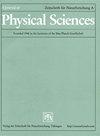Delta-shock for the Chaplygin gas Euler equations with source terms
IF 1.3
4区 物理与天体物理
Q4 CHEMISTRY, PHYSICAL
Zeitschrift Fur Naturforschung Section A-A Journal of Physical Sciences
Pub Date : 2023-10-27
DOI:10.1515/zna-2023-0181
引用次数: 0
Abstract
Abstract This article discusses the Riemann problem for the Chaplygin gas Euler equations that include the presence of two source terms. By means of variable substitution, two kinds of non-self-similar Riemann solutions involving delta-shock are constructed explicitly. For the delta-shock, the generalized Rankine–Hugoniot relations and the over-compressive entropy condition are clarified. Moreover, the position, propagation speed and strength of the delta-shock are given explicitly. It is discovered that the position of the delta-shock is a combination of an exponential function and a linear function, and the weight of the delta-shock is an exponential function of the time. Interestingly, even when the delta-shock is a straight line, the weight of the delta-shock is no longer a linear function of the time t . In addition, it is proved that the Riemann solutions converge to the corresponding ones of Chaplygin gas Euler equations with friction as k drops to zero, and the Riemann solutions converge to the corresponding ones of Chaplygin gas Euler equations as k and β tend to zero simultaneously. Furthermore, it is also shown that the limits of Riemann solutions are just the Riemann solutions to the transport equations with same source terms as the Chaplygin gas pressure falls to zero.带源项的Chaplygin气体欧拉方程的δ激波
摘要本文讨论了含有两个源项的Chaplygin气体欧拉方程的Riemann问题。利用变量代换的方法,明确构造了两类涉及delta激波的非自相似黎曼解。对于三角洲激波,澄清了广义rankne - hugoniot关系和过压缩熵条件。此外,还明确给出了三角激波的位置、传播速度和强度。研究发现,激波的位置是指数函数和线性函数的组合,激波的权重是时间的指数函数。有趣的是,即使脉冲是一条直线,脉冲的权重也不再是时间t的线性函数。此外,还证明了当k趋近于零时,黎曼解收敛于有摩擦的Chaplygin气体欧拉方程的对应解,当k和β同时趋近于零时,黎曼解收敛于Chaplygin气体欧拉方程的对应解。此外,还证明了当Chaplygin气体压力降至零时,黎曼解的极限只是具有相同源项的输运方程的黎曼解。
本文章由计算机程序翻译,如有差异,请以英文原文为准。
求助全文
约1分钟内获得全文
求助全文
来源期刊
CiteScore
3.00
自引率
5.60%
发文量
81
审稿时长
3.3 months
期刊介绍:
A Journal of Physical Sciences: Zeitschrift für Naturforschung A (ZNA) is an international scientific journal which publishes original research papers from all areas of experimental and theoretical physics. Authors are encouraged to pay particular attention to a clear exposition of their respective subject, addressing a wide readership. In accordance with the name of our journal, which means “Journal for Natural Sciences”, manuscripts submitted to ZNA should have a tangible connection to actual physical phenomena. In particular, we welcome experiment-oriented contributions.

 求助内容:
求助内容: 应助结果提醒方式:
应助结果提醒方式:


